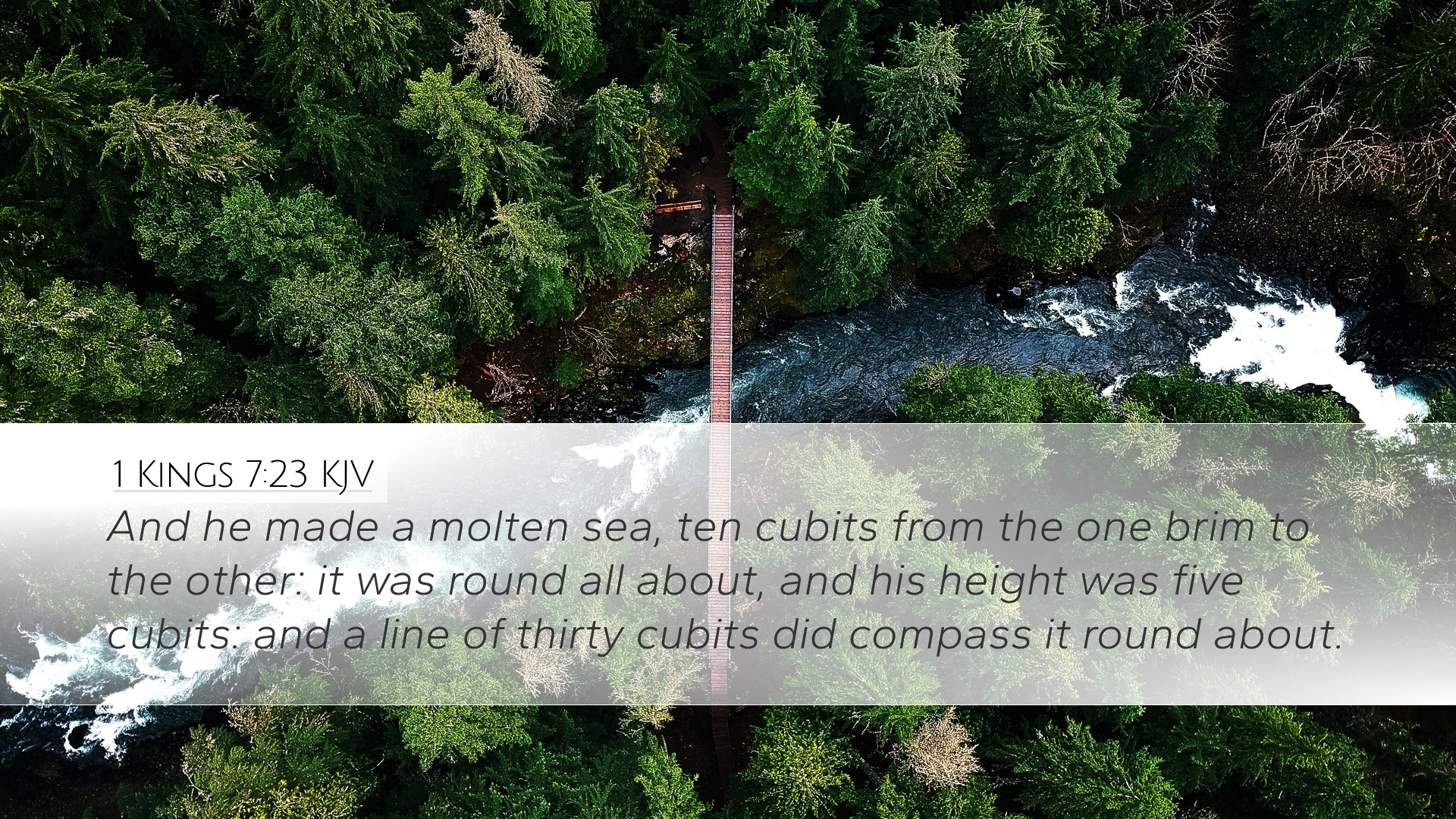Commentary on 1 Kings 7:23
1 Kings 7:23 states: "And he made a molten sea, ten cubits from the one brim to the other: it was round all about, and his height was five cubits: and a line of thirty cubits did compass it round about."
Overview of Exegesis
This verse describes the construction of the "molten sea," a significant piece of temple furniture crafted during King Solomon's reign. The molten sea served as a large basin, symbolizing purification and offering a practical function for the priests during their sacrificial duties. According to the dimensions provided, it was circular in design, evidencing both beauty and precision in construction. Understanding the biblical and cultural significance of the molten sea provides valuable insights into ancient Israel's worship practices.
Historical Context
The narrative occurs within the context of the building of Solomon's Temple, a monumental project that reflected Israel's wealth, unity, and devotion to God. The use of significant architectural features, such as the molten sea, illustrates the importance of ritual purity in ancient Hebrew worship.
Commentary Insights
Matthew Henry's Commentary
According to Matthew Henry, the molten sea symbolizes God's abundant grace. The dimensions signify completeness and sufficiency, allowing both physical and ritual purification. Henry emphasizes that the sea's size and its function highlight the vast grace that permeates God's provision for His people.
Albert Barnes' Notes
Barnes provides a detailed analysis of the measurements, clarifying the significance of the numbers: a ten-cubit diameter indicates a well-proportioned vessel, while the thirty-cubit circumference signifies a complete circle indicative of perfection. The molten sea's presence signifies the readiness of God to wash away sin and cleanse His worshipers. Barnes underscores its symbolic aspect reflecting the natural world—the sea—as an expression of divine authority.
Adam Clarke's Commentary
Clarke expounds on the marine symbolism inherent in the "sea." He discusses the nature of the basin and the material used in its making—copper—which not only reinforced durability but also blended sacrificial significance. He conveys that the molten sea is representative of the boundless mercy and blessings that flow from God. Clarke notes its physical volume, suggesting it can accommodate significant amounts of water needed for the ceremonial washing of priests.
Theological Reflections
The molten sea serves as a powerful theological metaphor in the Scriptures:
- Purification: The sea's primary function relates to ritual cleansing, paralleling the Christian understanding of baptism and the necessity of purification through Christ.
- Completeness of God's Provision: The ample measurements reflect God's sufficient grace, which envelops believers and purifies them from sin.
- Divine Presence: Just as the sea was situated in the Temple, indicating God's presence among His people, it foreshadows the ultimate indwelling of the Holy Spirit within believers post-Pentecost.
Practical Applications
For pastors and theologians, exploring the molten sea invites an examination of current practices of purification in worship. It challenges congregations to embrace the fullness of Christ's cleansing work and to communicate that message through their liturgical elements. Here are some applications:
- Emphasizing Cleanliness: Encourage practices of spiritual and moral cleanliness reminiscent of the cleansing rites in the Old Testament.
- Symbolize Abundance: Communicate the abundance of God's grace in preaching and teaching, reflecting the overflowing nature of the molten sea.
- Historical Insight: Use the construction of the molten sea to ground congregational worship in historical context, illustrating how God has always desired a pure people.
Conclusion
1 Kings 7:23 serves not only as a historical account of ancient Israelite worship but also embodies significant theological truths. The molten sea's creation reflects God's desire for purification and His provision of grace to His people. As we reflect on these insights, may we be compelled to deeper understanding and commitment to living in purity as representatives of God's Kingdom.


